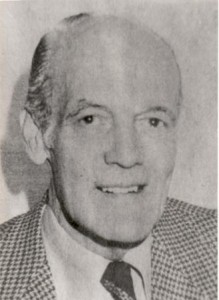 Fifty years ago the late Lou Stapleton made this remark when he watched a gangling,
Fifty years ago the late Lou Stapleton made this remark when he watched a gangling,
square-jawed fifteen year-old schoolboy trot out on a football field for the first time.
“That kid will be a great football player some day”. Lou couldn’t have made a
more exact prediction because that kid was Hawley “Huck” Welch, who, after a brilliant career with Hamilton and Montreal was inducted into Canada’s Football Hall of Fame in 1966.
He did everything the right way when he performed for the Collingwood Collegiate that season but what impressed Lou most of all was the ease in which Huck sent up those long, smooth sailing spiraling punts with his educated toe.
Huck left Collingwood in his sophomore year and moved off to Hamilton. It did not take Huck very long to get established in that hotbed of football. He helped Delta Collegiate win two successive Ontario Secondary Schools titles and the Tigers picked him up at the end of the 1927 season. He never looked back.
The Tigers won Grey Cups back to back in 1927 and 1928 and the deadly right foot and broken field running of Huck Welch played no small part in the success of that great Tiger team. They still talk about the kicking duels between Welch and Ab Box of the Argos.
One Saturday afternoon Welch kicked three singles and Box kicked two. Hamilton won 3-2. Ted Reeve wrote in his column. “Ab Box kicked the ball clean over Hamilton Mountain and Huck Welch kicked it back.”
He moved over to the Montreal Winged Wheelers in 1930 when Warren Stevens introduced the forward pass to Canadian football. He helped Montreal win the Grey Cup in 1931 and in 1933 crowned his great football career by winning the Jeff Russell Trophy as the most valuable player in Canadian Football.
He finished his career back in Hamilton in 1937.
Huck served with distinction as an officer in the Royal Hamilton Light Infantry in World War 11 and we had the pleasure of watching Huck and an all-star Canadian service football team beat the Americans in London=s White City Stadium in the spring of 1944. As a matter of fact we managed to pick up a bit of that 5 to 1 money the Yanks were tossing around.
